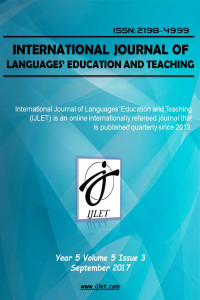Öz
Anahtar Kelimeler
Kaynakça
- Akan, S.B. I. (2007). A Suggested Speaking Course Syllabus in C1 (Proficiency) Level Defined in the Common European Framework of Reference for Languages. MA thesis, Unpublished. Ankara: Ankara University.
- Alderson, J. C., & Huhta, A. (2005). The development of a suite of computer based diagnostic tests based on the common European framework. Language Testing, 22(3), 301-320.
- Ames, C. K., & Gahagan, H. S. (1995). Self-reflection: Supporting students in taking ownership of evaluation. Heinemann, Portsmouth.
- Arsal, Z. (1998). Program Geliştirme Sürecinde İhtiyaç Analizinin Yeri ve Nasıl Yapıldığına ilişkin Program Geliştirme Uzmanlarının Görüşleri, Yüksek Lisans Tezi, Yayımlanmamış. Bolu: Abant İzzet Baysal Üniversitesi.
- Ataç, B. A. (2008). Özgün Değerlendirme Tekniği Bağlamında Avrupa Dil Gelişim Dosyası Uygulamalarının Okuma Becerisine Etkisi, Doktora Tezi, Yayımlanmamış. Ankara: Ankara Üniversitesi.
- Bahar, M. et. al (2006). Geleneksel Alternatif Ölçme ve Değerlendirme. Pegem Yayıncılık, Ankara.
- Bakla, A. (2006). A Suggested Reading Syllabus for A2 (waystage) Level Learners in regard to the European Language Portfolio based on the Common European Framework of Reference for Languages. MA thesis, Unpublished. Ankara: Hacettepe University.
- Barışkan, V. (2006). A Suggested Writing Syllabus for Students at Proficiency Level A2 Waystage Defined in the Common European Framework of Reference for Languages. MA thesis, Unpublished. Ankara: Hacettepe University.
- Barna, B. K., Kuti, Z., & Nemeth, T. N. (2008). Educational Framework and Programme Curriculum Developing Foreign Language Competence for Learners, Szerzok, Education.
- Berman, M. (2002). A Multiple Intelligence Road to an ELT Classroom. Carmarthen: Crown House Publishing. Second Edition.
- Biggs, J (1999) Teaching for quality learning at university: What the student does. Higher Education, 40/3: 374–376.
- Boud, D., & Falchikov, N. (1989). Student Self-Assessment in Higher Education: A Meta-Analysis, Review of Educational Research, 59(4), 111-124.
Öz
The aim of this research was to present a possible EFL curriculum design in line with the principles on the CEFR (Common European Framework of Reference for Languages). The qualitative data of the research were obtained through the interviews with the experts at TEFL through the semi-structured interview form developed by the researcher. The participants of the research were comprised of academics majored in both TEFL and the CEFR who were selected via purposeful sampling method. In order to analyse the qualitative data of this research, the content and thematic analyses were carried out using QSR Nvivo 8. According to the findings of the research, it was pointed out that the development of four language skills in order for language learners to be able to communicate, the consistency of content for learning and teaching EFL skills with real life situations, the employment of communicative language teaching methods, strategies, and techniques, and the use of alternative testing and assessment should be taken into consideration in the process of designing and developing key components of a CEFR-based EFL curriculum.
Anahtar Kelimeler
Kaynakça
- Akan, S.B. I. (2007). A Suggested Speaking Course Syllabus in C1 (Proficiency) Level Defined in the Common European Framework of Reference for Languages. MA thesis, Unpublished. Ankara: Ankara University.
- Alderson, J. C., & Huhta, A. (2005). The development of a suite of computer based diagnostic tests based on the common European framework. Language Testing, 22(3), 301-320.
- Ames, C. K., & Gahagan, H. S. (1995). Self-reflection: Supporting students in taking ownership of evaluation. Heinemann, Portsmouth.
- Arsal, Z. (1998). Program Geliştirme Sürecinde İhtiyaç Analizinin Yeri ve Nasıl Yapıldığına ilişkin Program Geliştirme Uzmanlarının Görüşleri, Yüksek Lisans Tezi, Yayımlanmamış. Bolu: Abant İzzet Baysal Üniversitesi.
- Ataç, B. A. (2008). Özgün Değerlendirme Tekniği Bağlamında Avrupa Dil Gelişim Dosyası Uygulamalarının Okuma Becerisine Etkisi, Doktora Tezi, Yayımlanmamış. Ankara: Ankara Üniversitesi.
- Bahar, M. et. al (2006). Geleneksel Alternatif Ölçme ve Değerlendirme. Pegem Yayıncılık, Ankara.
- Bakla, A. (2006). A Suggested Reading Syllabus for A2 (waystage) Level Learners in regard to the European Language Portfolio based on the Common European Framework of Reference for Languages. MA thesis, Unpublished. Ankara: Hacettepe University.
- Barışkan, V. (2006). A Suggested Writing Syllabus for Students at Proficiency Level A2 Waystage Defined in the Common European Framework of Reference for Languages. MA thesis, Unpublished. Ankara: Hacettepe University.
- Barna, B. K., Kuti, Z., & Nemeth, T. N. (2008). Educational Framework and Programme Curriculum Developing Foreign Language Competence for Learners, Szerzok, Education.
- Berman, M. (2002). A Multiple Intelligence Road to an ELT Classroom. Carmarthen: Crown House Publishing. Second Edition.
- Biggs, J (1999) Teaching for quality learning at university: What the student does. Higher Education, 40/3: 374–376.
- Boud, D., & Falchikov, N. (1989). Student Self-Assessment in Higher Education: A Meta-Analysis, Review of Educational Research, 59(4), 111-124.
Ayrıntılar
| Birincil Dil | İngilizce |
|---|---|
| Konular | İkinci Bir Dil Olarak İngilizce |
| Bölüm | Araştırma Makalesi |
| Yazarlar | |
| Yayımlanma Tarihi | 30 Eylül 2017 |
| Yayımlandığı Sayı | Yıl 2017 Cilt: 5 Sayı: 3 |

